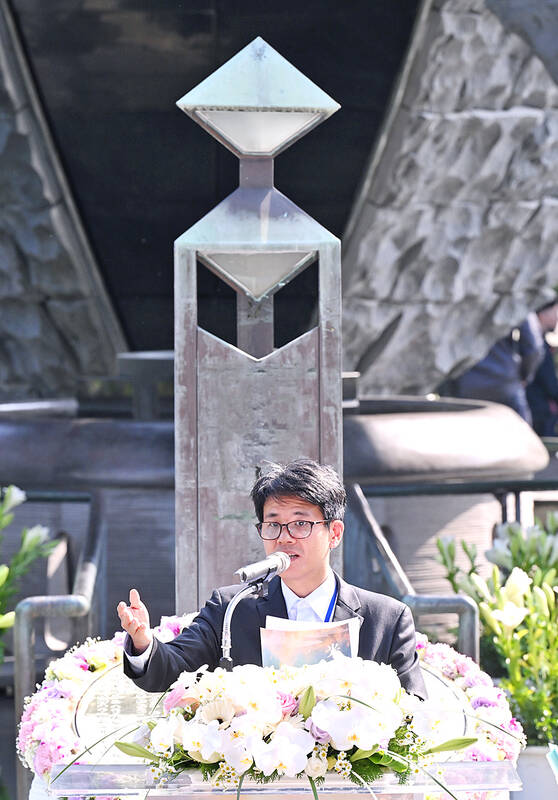The Chen Cheng-po Cultural Foundation yesterday announced that a minor planet has been named after late Taiwanese artist Chen Cheng-po (陳澄波).
The International Astronomical Union in January approved the name designation “Chenchengpo,” recognizing Chen as one of the “most iconic figures in Taiwanese art history.”
However, the foundation only shared the news on Facebook yesterday, the 78th anniversary of the 228 Incident — a mass crackdown in which Chen was among those executed by the then-Chinese Nationalist Party (KMT) regime.

Photo: Liu Hsin-de, Taipei Times
It expressed hope that the naming would encourage more people to learn about the historical event. Some estimates place the total death toll of the crackdown as high as 20,000.
Born in 1895 during the Japanese colonial era, Chen was a prolific artist known for “fusing Chinese and Western techniques” while exploring “avant-garde ideas,” the foundation said.
He was the first Taiwanese artist whose oil paintings were featured in the Japanese Imperial Art Exhibition.
The minor planet was discovered by Lulin Observatory in Nantou County in 2007 and was initially named 2005 EW228.

The Ministry of Economic Affairs has fined Taobao NT$1.2 million (US$36,912) for advertisements that exceed its approved business scope, requiring the Chinese e-commerce platform to make corrections in the first half of this year or its license may be revoked. Lawmakers have called for stricter enforcement of Chinese e-commerce platforms and measures to prevent China from laundering its goods through Taiwan in response to US President Donald Trump’s heavy tariffs on China. The Legislative Yuan’s Finance Committee met today to discuss policies to prevent China from dumping goods in Taiwan, inviting government agencies to report. Democratic Progressive Party Legislator Kuo Kuo-wen (郭國文) said

The Ministry of Economic Affairs has fined Taobao NT$1.2 million (US$36,900) for advertisements that exceeded its approved business scope and ordered the Chinese e-commerce platform to make corrections in the first half of this year or its license would be revoked. Lawmakers have called for stricter supervision of Chinese e-commerce platforms and more stringent measures to prevent China from laundering its goods through Taiwan as US President Donald Trump’s administration cracks down on origin laundering. The legislature’s Finance Committee yesterday met to discuss policies to prevent China from dumping goods in Taiwan, inviting government agencies to report on the matter. Democratic Progressive Party

Taiwan and its Pacific ally Tuvalu on Tuesday signed two accords aimed at facilitating bilateral cooperation on labor affairs, according to Taiwan’s Ministry of Foreign Affairs (MOFA). The governments inked two agreements in Taipei, witnessed by Foreign Minister Lin Chia-lung (林佳龍) and visiting Deputy Tuvaluan Prime Minister Panapasi Nelesone, MOFA said in a news release. According to MOFA, the agreements will facilitate cooperation on labor issues and allow the two sides to mutually recognize seafarers’ certificates and related training. Taiwan would also continue to collaborate with Tuvalu across various fields to promote economic prosperity as well as the well-being of their

Sung Chien-liang (宋建樑), who led efforts to recall Democratic Progressive Party (DPP) Legislator Lee Kun-cheng (李坤城), was released on bail of NT$80,000 today amid outcry over his decision to wear a Nazi armband to questioning the night before. Sung arrived at the New Taipei District Prosecutors’ Office for questioning in a recall petition forgery case last night wearing a red armband bearing a swastika, carrying a copy of Adolf Hitler’s Mein Kampf and giving a Nazi salute. Sung left the building at 1:15am without the armband and covering the book with his coat. Lee said today that this is a serious